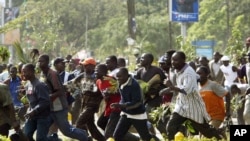Human Rights Watch is urging Kenya to crack down on rights abuses and enact promised political reforms ahead of its national elections in March.
In a report published Friday, the New York-based group warned that heightened tensions across the country could lead to an outbreak of violence and threaten the voting.
The elections are the first under Kenya's new constitution enacted in 2010. Following the last national vote in 2007, clashes killed about 1,300 and left 650,000 displaced.
The HRW report says there still is lingering resentment from the violence five years ago. It warns that groups across the country are arming themselves in preparation for possible clashes around the March polls.
Human Rights Watch said the government has not addressed the root causes of the violence, and it called on authorities to take "urgent steps, including the arrest and fair trial of all those who directly incite or organize violence."
It estimates that inter-communal clashes have killed nearly 500 people and displaced almost 120,000 since the beginning of 2012.
Highlighting the problem, officials Friday said at least six people were killed when bandits raided a remote village in Kenya's northern Rift Valley Province, stealing cattle and clashing with police.
A series of tribal clashes and retaliatory attacks also has killed dozens in recent months in Kenya's coastal regions, where inter-communal tensions remain high.
Human Rights Watch says these attacks, as well as the failure to punish those responsible for the violence following the disputed 2007 vote, is threatening the peaceful, free and fair nature of the upcoming elections.
It says tensions also have been raised over the International Criminal Court's upcoming trial against presidential candidate Uhuru Kenyatta and three other Kenyans accused of committing crimes against humanity during the 2007-2008 unrest.
The four defendants face charges that include murder, forcible deportation and the persecution of Prime Minister Raila Odinga's supporters. Odinga lost to President Mwai Kibaki in a disputed 2007 run-off, but later became prime minister as part of a power-sharing agreement.
Some fear the April trial could conflict with a presidential run-off vote, which may be necessary if no candidate wins an outright majority in the first round.
In a report published Friday, the New York-based group warned that heightened tensions across the country could lead to an outbreak of violence and threaten the voting.
The elections are the first under Kenya's new constitution enacted in 2010. Following the last national vote in 2007, clashes killed about 1,300 and left 650,000 displaced.
The HRW report says there still is lingering resentment from the violence five years ago. It warns that groups across the country are arming themselves in preparation for possible clashes around the March polls.
Human Rights Watch said the government has not addressed the root causes of the violence, and it called on authorities to take "urgent steps, including the arrest and fair trial of all those who directly incite or organize violence."
It estimates that inter-communal clashes have killed nearly 500 people and displaced almost 120,000 since the beginning of 2012.
Highlighting the problem, officials Friday said at least six people were killed when bandits raided a remote village in Kenya's northern Rift Valley Province, stealing cattle and clashing with police.
A series of tribal clashes and retaliatory attacks also has killed dozens in recent months in Kenya's coastal regions, where inter-communal tensions remain high.
Human Rights Watch says these attacks, as well as the failure to punish those responsible for the violence following the disputed 2007 vote, is threatening the peaceful, free and fair nature of the upcoming elections.
It says tensions also have been raised over the International Criminal Court's upcoming trial against presidential candidate Uhuru Kenyatta and three other Kenyans accused of committing crimes against humanity during the 2007-2008 unrest.
The four defendants face charges that include murder, forcible deportation and the persecution of Prime Minister Raila Odinga's supporters. Odinga lost to President Mwai Kibaki in a disputed 2007 run-off, but later became prime minister as part of a power-sharing agreement.
Some fear the April trial could conflict with a presidential run-off vote, which may be necessary if no candidate wins an outright majority in the first round.





